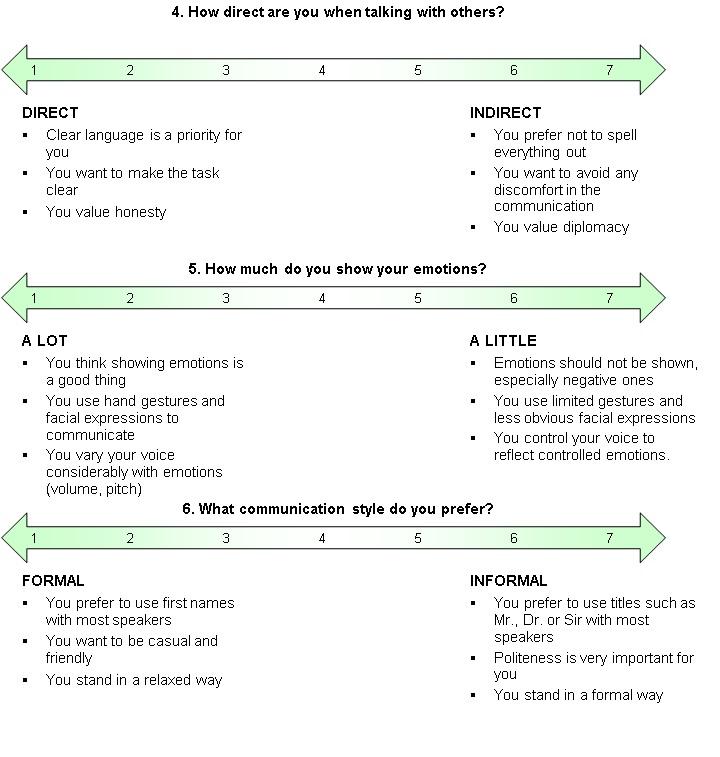Cultural Differences in the Way We Speak
Carrying on from our blog about cultural differences in body language, we now look at one of the most important areas of cross-cultural understanding - that of communication.
Communication covers many areas such as verbal and non-verbal.
One of the most obvious and apparent ways in which cultures differ is in the way we speak.
Cultures differ in the directness of what they say, how expressive they are and how much formality they use.
Here are a few examples of how these communication differences can vary across cultures.
DON'T MISS THE FREE DOWNLOAD AT THE END!
HOW DIRECT ARE YOU WHEN YOU SPEAK?
- Direct: US, Germany, Australia, Finland and the Netherlands.
- Less direct: France, Spain, Saudi Arabia, Ireland, and the UK.
- Indirect: China, Japan, Malaysia, Singapore, Venezuela and India.
HOW EMOTIONAL ARE YOU WHEN YOU SPEAK?
- A lot: Mediterranean Cultures, Latin Europe and Latin America.
- A little: East and Southeast Asia, Nordic and Germanic Europe.
- In between: Cultures like the USA, Canada, Australia, New Zealand, Eastern Europe and South Asia generally show emotions in different contexts and to varying degrees.
HOW FORMAL ARE YOU WHEN YOU SPEAK?
- More Formal: most of Europe and Asia, Latin America, Mediterranean cultures and the Arab World.
- More Informal: Australia, the USA, Canada, New Zealand, Denmark, Norway and Iceland.
Culture Is Not That Simple
It is important to remember two points.
1) Not everyone from a culture is going to conform to a particular stereotype. We only make generalisations about cultures based on traits, values and behaviours. Every person is an individual and needs to be treated as such. Generalisations simply help us understand the cultural climate we might be working in.
2) The way we always compare other cultures is with our own. The English may be more informal than the Japanese, but can still be considered more formal in comparison to the US. What matters is where you stand in relation to other people and how this may affect you working with people from other cultures. Cultural differences are relative.
D.I.Y Cultural Awareness Training
Find someone who knows you well and will give you honest feedback.
Check the illustration below. Where would you plot yourself on the scale of 1-10 in terms of these different ways of talking. Ask your partner to then mark you.
Any differences? Can you think why? Consider what you think about the way they talk and then reframe your own perceptions.

Questions to Ask Yourself
- Have you ever heard the phrase, “Say what you mean and mean what you say”? This is a saying valued by more direct cultures, such as the Netherlands, Germany, the U.S., and Australia.
- Where would you put the UK or any other country of interest on these dimensions? What clues and examples can you use to demonstrate this?
- Can you think of an example where these differences surfaced in a conversation? What happened?
- How do you tend to react when someone uses approach, emotions and style differently than you? When people do not act as we would expect, we may have an emotional reaction. To be effective, we should not expect people to behave as we do, and when their behaviour is different, beware of any automatic responses.
Download our Self-Study Guide to Cultural Differences
If you are interested in learning more about communication and culture, we recommend you download our free self-study guide to cross cultural communication.
We hope you have enjoyed our brief guide to cultural differences in the way we speak.
Help us by sharing this blog so as many people as possible can start learning about cultural differences!
Photo by LinkedIn Sales Solutions on Unsplash
By accepting you will be accessing a service provided by a third-party external to https://www.commisceo-global.com/

 +44 0330 027 0207 or +1 (818) 532-6908
+44 0330 027 0207 or +1 (818) 532-6908
